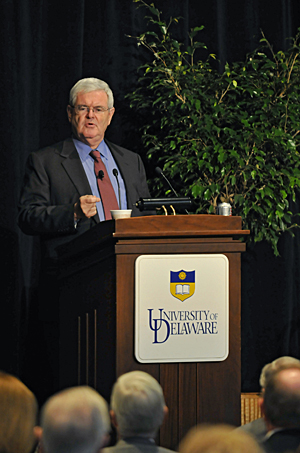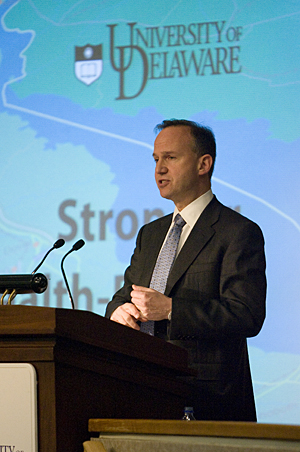5:18 p.m., March 24, 2009----Keynote addresses by Delaware Gov. Jack Markell and Newt Gingrich, former Speaker of the House of Representatives and founder of the Center for Health Transformation, anchored the program for a health sciences conference at the University of Delaware today.
“Stronger Health-Based Partnerships,” the fourth in a series of University of Delaware conferences organized around the creation of knowledge-based partnerships, attracted some 400 participants from academic institutions, companies, service providers, and government agencies. The daylong event focused on outreach efforts to improve the quality of healthcare in the region.
Markell began by praising the formation of the Delaware Health Sciences Alliance, which he said has the potential to stimulate discussions and generate ideas that can provide solutions to various health care issues, including cost, availability, access and quality.
The alliance includes the Christiana Care Health System, Nemours, Thomas Jefferson University and the University of Delaware.
“The subject of health care goes beyond the provision of health care,” Markell said. “It's an industry and an important area of economic development for the state.”
With the economic downturn, which Markell said has had a disproportionately large effect on Delaware, many health care issues have worsened. He pointed to increases in the number of uninsured people, the instances of uncompensated care, and the cost of health insurance premiums.
“Without real action at the federal level, things are likely to get worse,” he added.
Based on President Barack Obama's stated intention to enact national reform within the next year, Markell said that he plans to wait for a few months to determine the direction of federal change before exploring options for Delaware. But he shared core principles that will undergird any health core reform in the First State: cost containment, choice, flexibility and personal responsibility.
“As the national debate takes place, we will focus on our own ability to innovate and grow, which is why I'm such a big fan of these partnerships,” he said. “Delaware is never going to win the battle of the big check. But we can turn what looks like our weakness -- our size -- into a strength in terms of our ability to be more flexible, nimble, and responsive. We can lead the recovery because we can outpace others.”
“There is no better example of that than this health sciences alliance,” he continued. “These outstanding institutions are looking to team on a variety of areas that can be critical to our state. I want to thank all of you for taking this bold step forward at a time when we need people to think about how we can differentiate ourselves through a shared enterprise.”
Markell said that ongoing collaborative efforts in the life sciences, biotechnology and health and medical services embody the best of what Delaware has to offer.
“Delaware already has world-class capabilities in rehabilitation services and could emerge as a national leader in this area,” he added.
“We're now looking to the future,” Markell said, “where innovation will come not from the silo of a single company but from the collaborative effort of some of the state's best minds. I believe that if we encourage projects like this in health care and in other fields as well, that's what it will take to insure that our best days are in front of us.”
Like Markell, Gingrich spoke of the strong value of collaboration and the close tie between health care and the economy. “Health care is the largest single sector of the American economy and the largest user of knowledge,” he said.
At the same time, however, he pointed out that it is an extremely decentralized and specialized enterprise. “The different systems -- doctor's offices, labs, pharmacies, hospitals, long-term care facilities, home care -- all have different rhythms,” he said. “It's very easy to underestimate the complexity of the system you're trying to change.”
“There's also a legitimate conservatism about breaking something that's working,” he continued. “There's a belief that we need to do better, but there's a caution about that because the people involved are justifiably risk averse.”
Gingrich said that he founded the Center for Health Transformation because he was aware of the magnitude of the problem of health care reform, and he realized that it would take a collaborative effort and a systemic approach to effect it.
“You don't get from here to there by a forced march,” Gingrich said, “but rather by trying to figure out who are the people moving in the right direction and then asking what they can learn from each other.”
He also pointed to the need to create a continuously evolving system that can identify better practices and adapt to them.
Gingrich described the model adopted by his organization in addressing health care reform, which includes four boxes: the individual, the community, the delivery system, and finance.
“Finance is the fourth box,” Gingrich said, “and, unfortunately, most politicians have focused on that box. But the first three boxes are where health care actually occurs. It's a mistake to use the finance box to effect change. The current system of health care is capable of absorbing all of the money it's given.”
He emphasized the need to focus first on changing individual attitudes and habits, promoting communities with healthy eating and exercise options, and creating efficient and effective health care delivery systems.
Gingrich said that the four-box model is designed to be dynamic. “This is the most dynamic era of scientific change in human history,” he said. “Solutions developed today may not work five years from now. So we have to design government structures that are permanently evolving and permanently adaptable. The society that can best adapt to change is going to be healthier, more productive, and safer.”
In a press conference following his talk, Gingrich was asked to address how his philosophy applies specifically to Delaware.
His response echoed Markell's earlier comments. “Delaware has a unique opportunity because it's the right size,” Gingrich said. “The governor can lead the entire community, and it's small enough that you can actually get things done.”
“A healthier state has a competitive advantage,” he said.
Article by Diane Kukich
Photos by Kathy Atkinson and Evan Krape




